Key takeaways:
- User interviews offer deep insights into user experiences and emotions, revealing needs that surveys may miss.
- Feedback from users can drive innovation and is essential for creating features that truly resonate with them.
- Challenges include users hesitating to share honest feedback and the need for tailored questions to guide discussions effectively.
- Implementing user insights should be an ongoing iterative process that considers broader trends from collective user feedback.
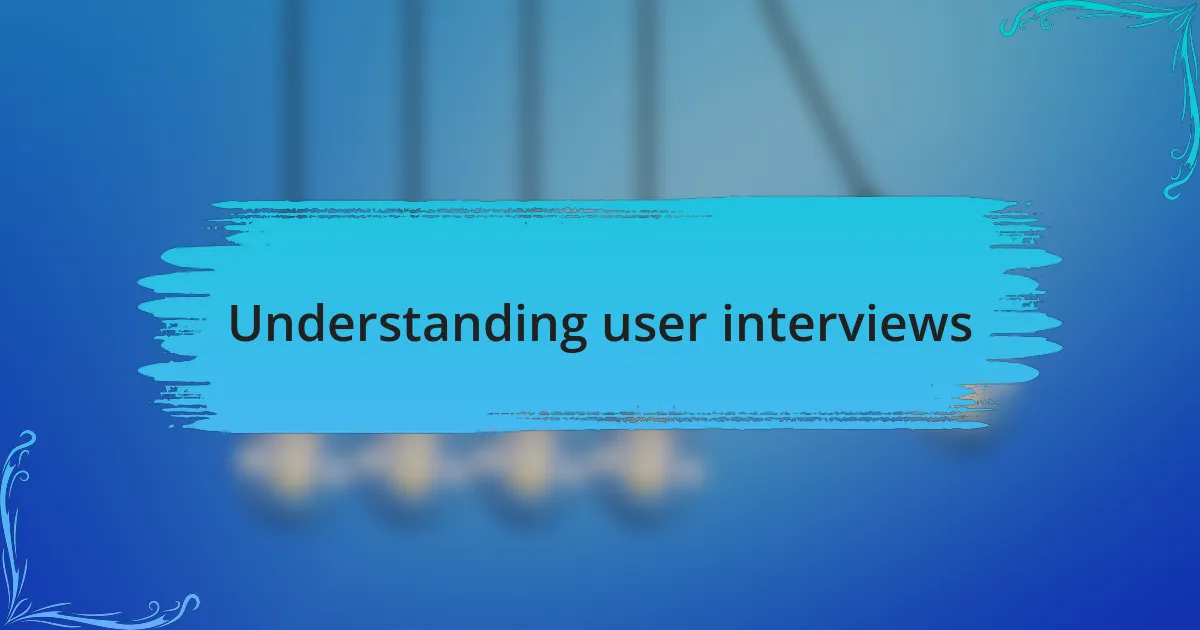
Understanding user interviews
User interviews are a powerful tool in understanding your audience and their needs. I remember my first user interview, feeling a mix of excitement and anxiety. Asking open-ended questions allowed the user to share insights I hadn’t anticipated, highlighting nuances that just wouldn’t emerge from surveys.
The emotional depth of these interviews is often surprising. I found that users aren’t merely sharing their experiences; they’re revealing their frustrations and desires. When one user described their struggle with an app’s navigation, I could feel their frustration resonate with my own past experiences. It made me realize how crucial it is to listen actively.
Have you ever thought about how users interact with your app on a personal level? Each story shared in an interview is a thread in the fabric of your app’s development. For me, these conversations transformed how I approach design, reminding me to prioritize empathy and understanding in every feature we develop.
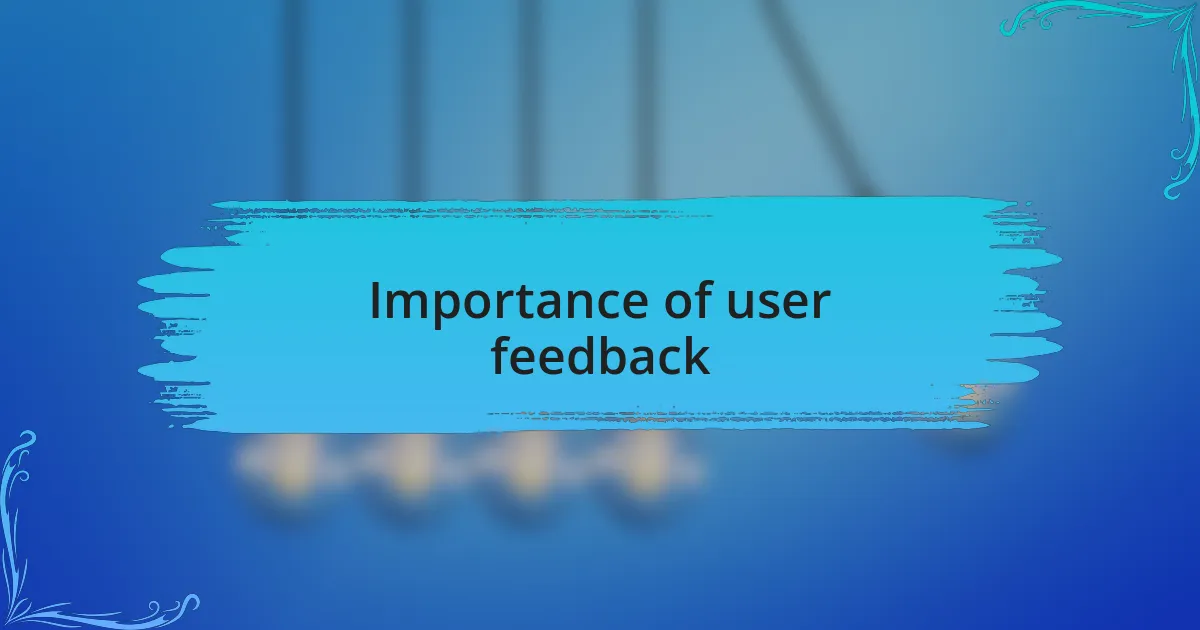
Importance of user feedback
User feedback is essential in crafting an app that truly resonates with its audience. I once implemented a feature based solely on assumptions, thinking it would enhance the user experience. However, after gathering feedback, it turned out users found it confusing and unnecessary. This experience reminded me that assumptions can often lead us astray; listening to users is the compass guiding our decisions.
In my journey through various development projects, I’ve learned that feedback is not just about correction—it’s about collaboration. When I worked closely with users during testing phases, their suggestions often sparked innovative ideas I never considered. Have you ever experienced that “aha!” moment while discussing an app with a user? It’s exhilarating to see how their real-life experiences can guide enhancements and create solutions that genuinely matter.
Every piece of feedback carries a piece of the user’s story, and understanding these stories continuously shapes my approach to app development. I recall a user who shared how a minor adjustment significantly improved their daily routine. This underscored the profound impact even small changes can have, pushing me to value and prioritize user insights as pivotal to the development process.
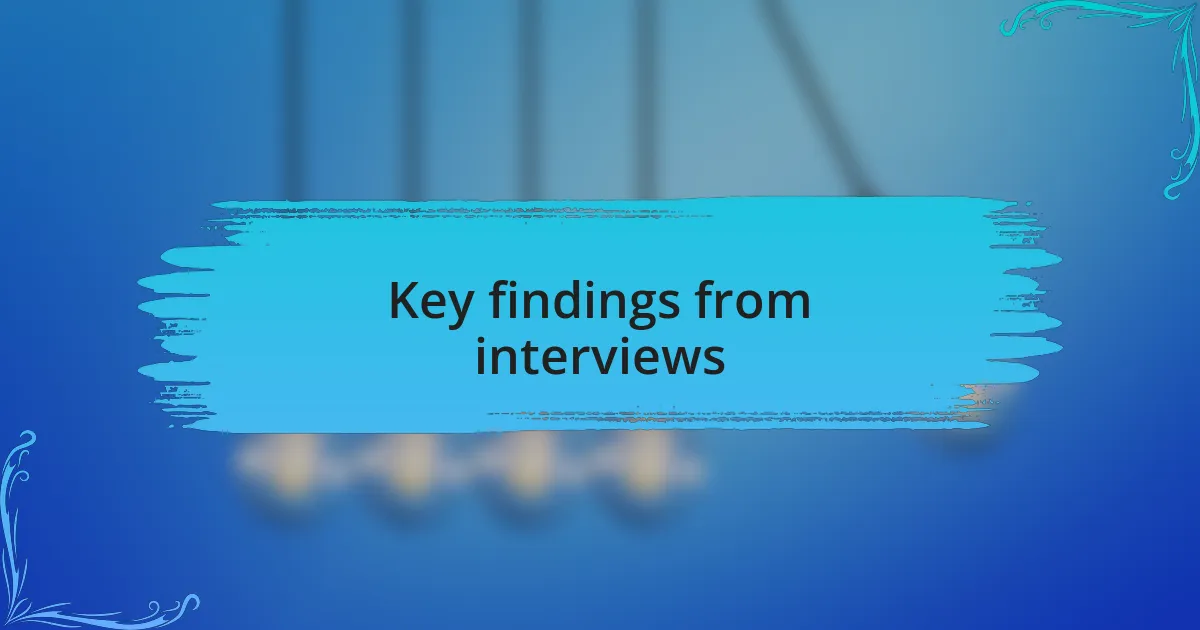
Key findings from interviews
Hearing directly from users has revealed startling insights about their true needs. For instance, during one interview, a user recounted their struggle with navigation in our app; their frustration was palpable. This not only highlighted a critical design flaw but also made me reflect on how often we overlook the importance of intuitive user journeys. Have you ever felt lost in an app, wondering how you got there? It’s moments like these that turn feedback into a call to action.
Another finding that stood out to me was how users value simplicity over complexity. I distinctly remember a conversation with a user who cherished minimalist design. They explained how cluttered interfaces left them overwhelmed. This made me rethink our approach and focus on clarity rather than cramming in features. Why complicate what can be simple?
Lastly, the emotional connection users develop with apps often dictates their loyalty. One user’s heartfelt story about how our app had improved their productivity struck a chord with me. It was a reminder of the profound impact we can have on their lives, transforming the development process from a mere technical endeavor to a meaningful mission. Hearing these narratives makes one wonder, how can we ensure we continue to nurture that bond?
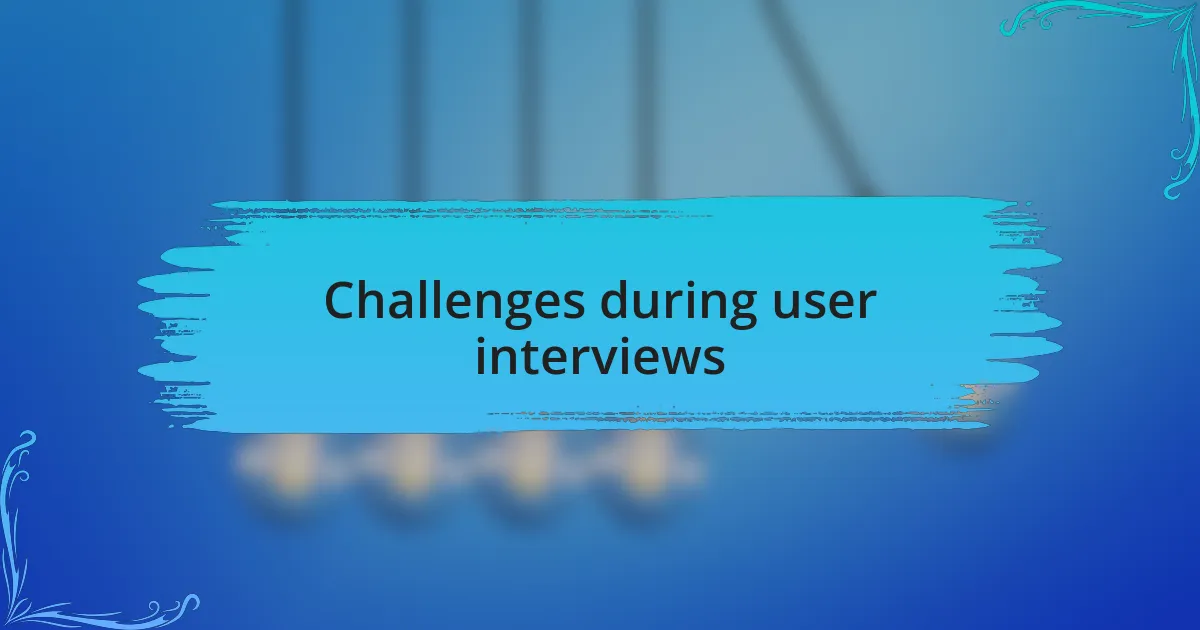
Challenges during user interviews
During user interviews, I often encounter the challenge of users holding back their true feelings. It’s not uncommon for them to sugarcoat their experiences, perhaps out of concern for my feelings as a developer. I remember one instance when a user glossed over their issues with our app’s performance, leaving me to wonder—were they afraid to be honest, or did they feel their feedback wouldn’t make a difference? This realization emphasizes the need for creating a safe space where users feel comfortable sharing their unfiltered thoughts.
Another hurdle I’ve faced is the variability in users’ interpretations. A single question can evoke a wide range of responses, leading to confusion in the data we collect. For example, when I asked users about their favorite features, one individual launched into a detailed discussion about a minor element, while another remained vague. It made me realize how crucial it is to tailor our questions more precisely to guide users toward the insights we truly seek. How do we find that balance between open-ended questions and focused inquiries?
Finally, time constraints can be a significant barrier in user interviews. I often feel rushed to cover everything within a limited timeframe, which can stifle deeper conversations. In one memorable interview, the clock ticked down, and I sensed that we were just scratching the surface of a critical topic. It left me pondering how much richer our insights could be with more open-ended discussions, encouraging users to share at their own pace. Wouldn’t it be beneficial to allow more flexibility for exploration in future sessions?

Useful tools for conducting interviews
When I conduct user interviews, I find that note-taking apps like Evernote or Notion can be incredibly helpful. Not only do they allow me to organize my thoughts, but they also enable me to tag and categorize feedback for easy retrieval later. In one interview, I quickly jotted down key points in Notion and later discovered that organized notes led to clearer insights during our development meetings. How often do we miss valuable information simply because it was poorly documented?
For recording interviews, I rely on tools like Zoom or Otter.ai, which provide reliable transcription features. The last time I used Otter.ai, I was amazed at how accurately it captured the conversation in real-time, saving me hours of manual transcription work. Having that instant documentation means I can focus on listening rather than worrying about missing a crucial quote—don’t we all want to ensure we record the “aha” moments when they happen?
Additionally, I find that using visual aids during interviews can spark richer discussions. When I introduced wireframes of our app to participants, it transformed the dialogue completely. Users who were previously hesitant became more animated, pointing out features they loved or suggesting changes in ways I hadn’t anticipated. It made me wonder: could visual context be the key to unlocking deeper user insights?
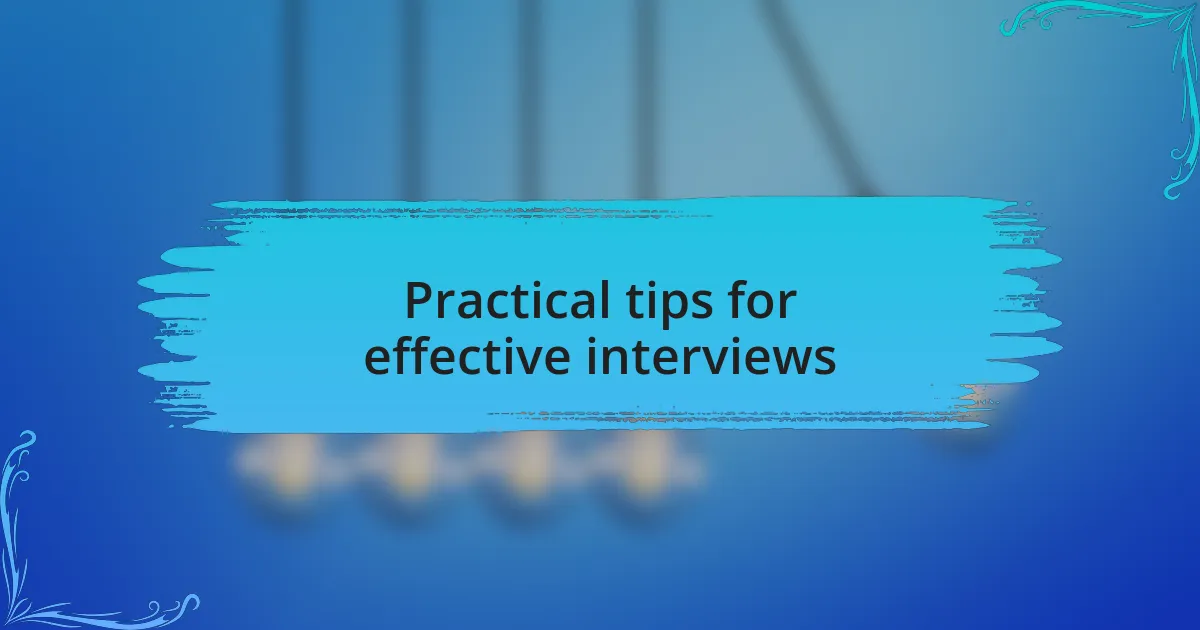
Practical tips for effective interviews
One practical tip I’ve found essential is to craft open-ended questions that encourage detailed responses. For instance, instead of asking, “Do you like this feature?” I might say, “What are your thoughts on this feature and how does it impact your use of the app?” This slight change invites users to share their experiences and feelings, leading to much richer insights. I remember a time when a participant described a feature as “life-changing”—that single phrase has stuck with me and fueled improvements.
Building rapport with interviewees can also significantly enhance the quality of the feedback. A relaxed participant is more likely to share honest thoughts. I usually begin with a casual chat or a light-hearted icebreaker. Once, a user opened up about their frustrations regarding an app’s functionality after we shared a few laughs about our tech mishaps. It made me realize that trust can be a game changer in user interviews. Have you ever noticed how a little warmth can transform the conversation?
Lastly, don’t forget to actively listen. This means engaging with what the interviewee is saying, nodding, and occasionally summarizing their points to show understanding. During one session, I found myself so immersed in their story that I asked a follow-up question they hadn’t expected, leading to unexpected insights. It was in that moment I learned that genuine interaction often leads to the most valuable feedback. Isn’t it fascinating how true engagement can uncover gems of information?
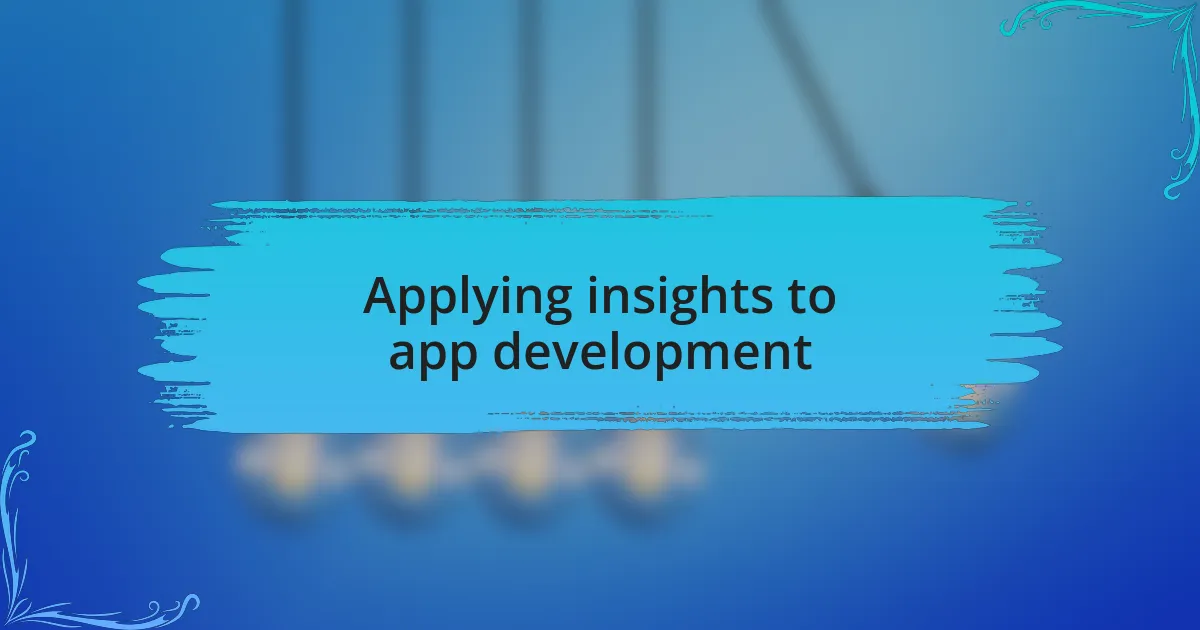
Applying insights to app development
When applying insights gathered from user interviews, I find it crucial to prioritize user-centered design principles. I once had a user who described navigating our app as “like finding my way through a maze.” This feedback prompted my team to rethink the app’s interface completely, leading to a streamlined navigation experience. Have you ever considered how a single comment can change the direction of an entire project?
Implementing changes based on user feedback should also be an iterative process. After incorporating user suggestions, I frequently circle back to them to assess our improvements. I recall a situation where a small tweak based on user input significantly increased engagement, confirming the importance of maintaining an ongoing dialogue. How often do we assume that initial changes are sufficient?
Moreover, analyzing patterns from user interviews can reveal broader trends that are not immediately evident. In one session, multiple users noted similar issues with app performance during updates, which led to a comprehensive review of our development cycle. I realized then that collective insights can shape overall strategy, driving us toward a more robust and user-friendly app. Isn’t it interesting how user feedback can redefine our approach to app development?